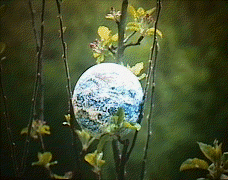| In spite of the legion of difficulties, a
number of researchers remain faithfully optimistic that future discoveries will change
things. Many of these researchers share a deep philosophic commitment against the idea
that any force of conscious intelligence could have "created" life - such
ideas are deemed non-science - and therefore cannot even be considered (see the Christian
De Duve article below as an example). However, science is a search for truth - and a
genuine search for the truth cannot be made when one sets specific preconditions for what the "truth"
must be before one begins the search. The philosophic commitment to a natural origin of
life has led many, including the famous scientist Carl Sagan, to conclude that
abiogenesis simply must be far easier than it seems
- the reason being that we know life did appear, and we are "certain" in our
assumption it has a natural origin, therefore our existing science must be
all wrong about all the difficulties involved. |
 |
|
| Denial of scientific facts in favor of
philosophic commitments is indeed a dangerous precedent - and yet it is openly presented
under the guise of science in this field. Finally, to summarize the current state of this
field of science we have: 1) failure to identify any
"pre-biotic" systems which spontaneously organize themselves into useful or
self-replicating forms; 2) a "pre-biotic
soup" which is simply not found in the fossil record, and for which no one has yet identified any clear source of significant organics; 3)
an RNA World theory with no known set of conditions that could cause or maintain it, and
no scientific evidence supporting the possibility of true RNA self-replication; and 4) an
early Earth where life appears as soon as surface conditions can support it, allowing
virtually no time for any pre-biotic evolution. After decades of research, and a great
increase in our knowledge, problems in abiogenesis have become far more numerous than many
scientists had hoped in the giddy optimism when the Stanly Miller
experiments and the discoveries of Watson and Crick were published over 50 years ago.
Yet our colleges texts still echo that old optimistic outlook, in spite of
our new knowledge and discoveries. In spite of this, those individuals immutably committed to a fully
natural abiogenesis suggest that perhaps some new discovery will entirely re-write all the
research done to date and provide new enlightenment, but as each new year rolls on, the
likelihood of such a discovery grows more and more bleak and remote. In many
ways, the leading proponents simply are becoming more entrenched in their
faith that no matter what the scientific data currently shows, abiogenises
must eventually be found true. Please note that my criticism
here is not simply taking a few random shots at perceived inconsistencies in some
peripheral portions of the theories, but an open rebuttal of the core and central
theories of abiogenesis. |
Please also
note that the problems in this field are not a matter of what we don't know
- an information gap that may someday be filled in with future discoveries.
The problems are what we do
know about life, its complexity and the potential for simple organic
compounds to spontaneously self-organize into self-replicating systems.
There is no "gap" to fill in, for abiogenesis to become demonstrated as
fact, the truths we do know about biochemistry and the early earth would
actually have to be proven false. As a result, in spite of the rosy
but very incomplete picture presented in may college biology texts, there are some strong reasons to doubt if
life really could have originated by a purely natural means. Abiogenesis is a field rich
in ideas, proposals and philosophies, and it is well supported in our popular culture and
ideology, but the theories are essentially bankrupt of any supporting data when the
research is conducted without pervasive investigator interference. When even a simple
pre-biotic, self-replicating system using RNA or some other like material is a
system that would require a complexity
far beyond all of our current scientific, engineering and computing capacity
to design, that simple fact makes a very clear statement about abiogenesis. If we
cannot, with all of our technology intentionally design or create such
a system, what logic is there in believing it happened by itself without any creator or
designer? My conclusion after a thorough examination of this field, is that
the abiogenesis of even the simplest pre-biotic, self-replicating system if
it is even possible, would require a level of design and engineering light
years beyond our current capabilities. To state it plainly, if such a system is even possible, a designer was
required. The origin of life is a scientific unconformity, it is an event not explained by
any natural process. Life exists, and so it follows that it is not a meaningless undirected accident -
if a designer (read
Creator, God) is responsible for the origin of life on earth. The evidence strongly
implies that a being of God-like capability was required, and "In the beginning God created......." |
